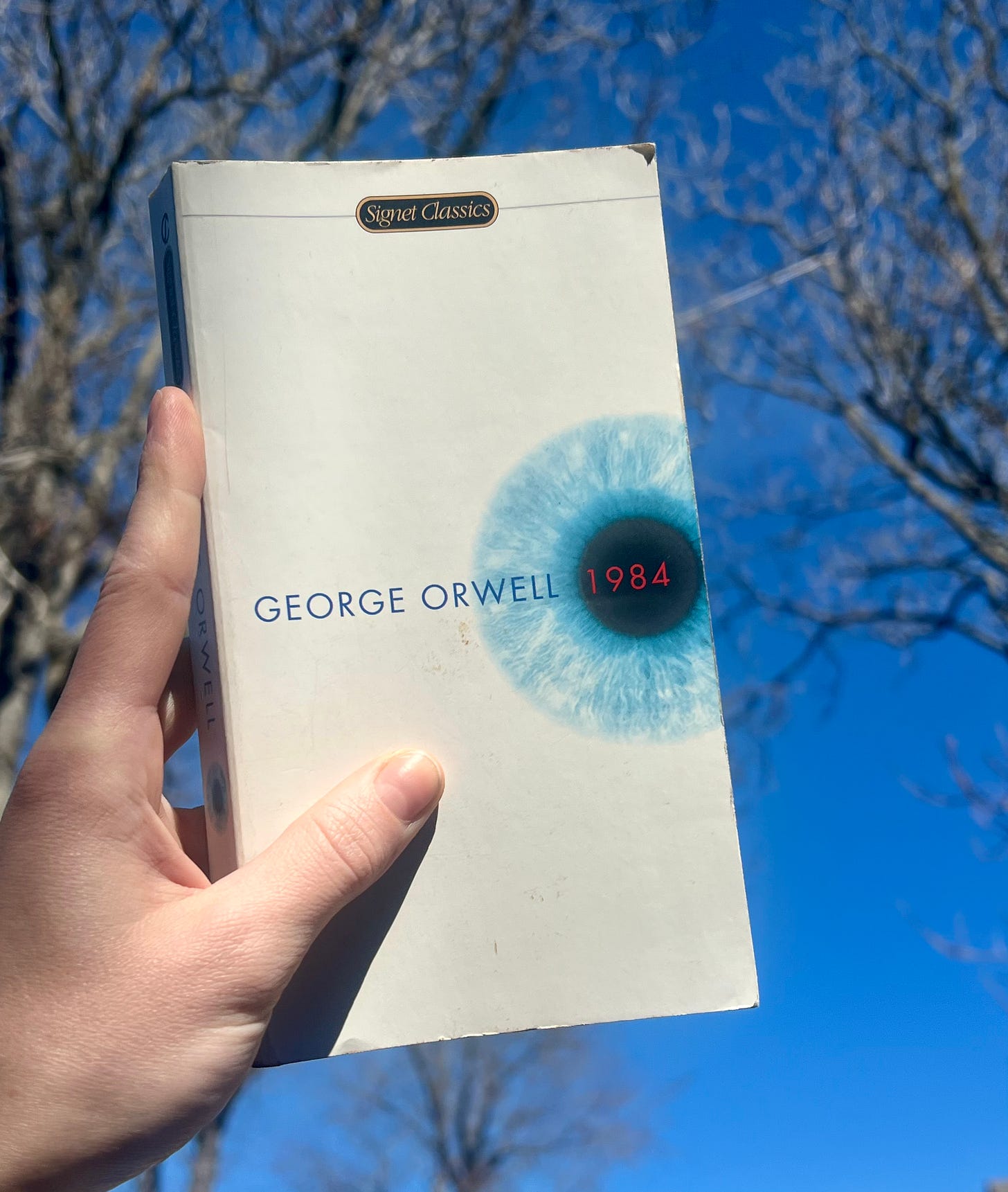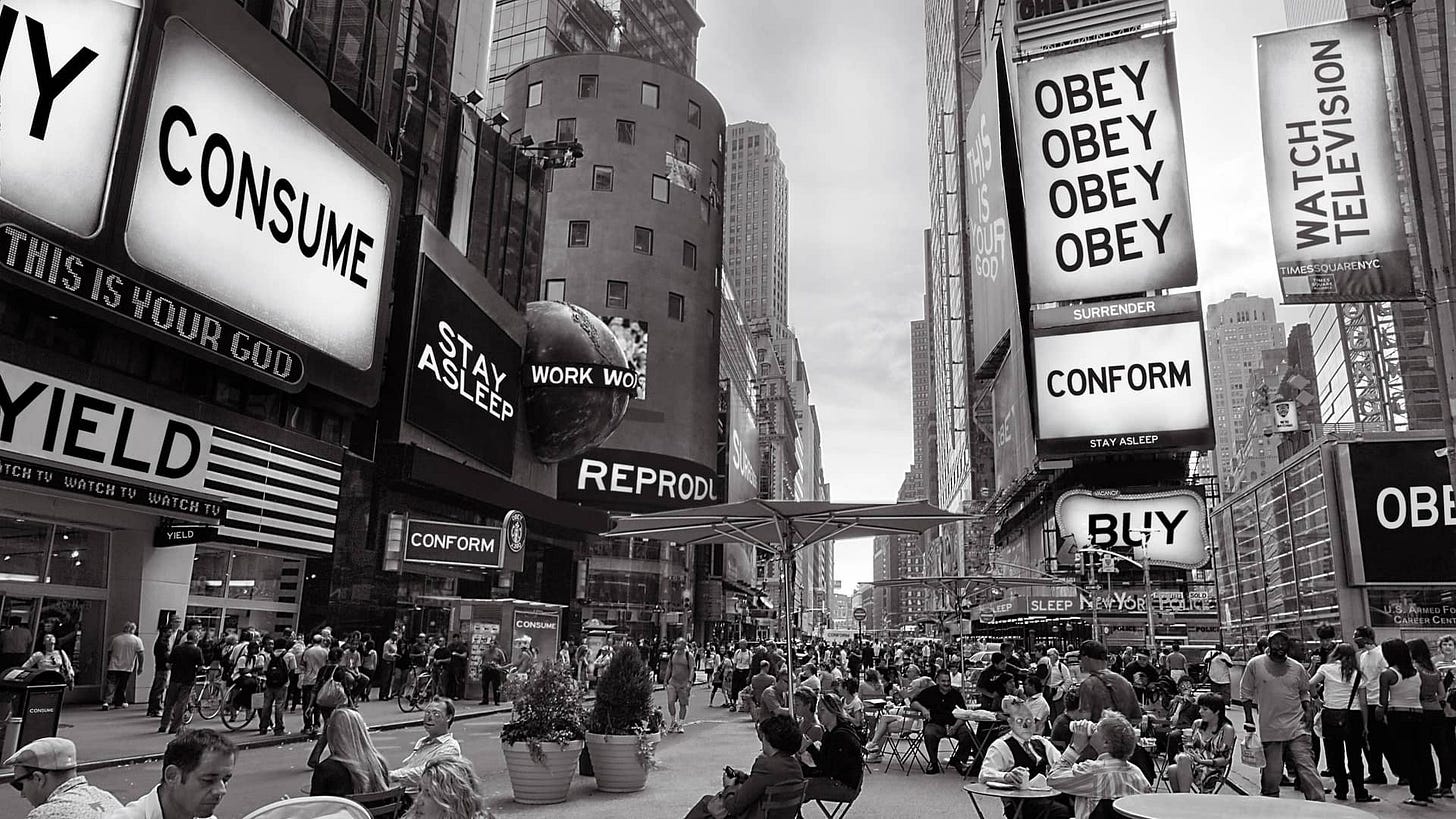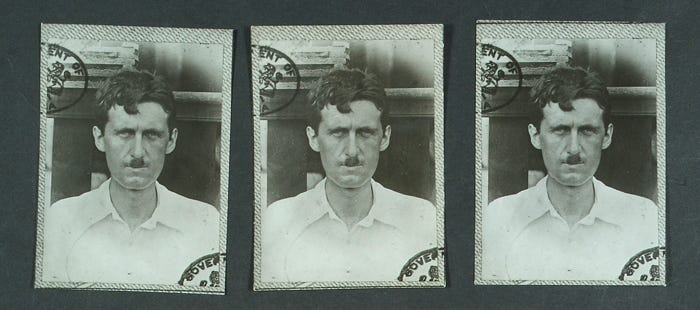Committing Thoughtcrimes
I like to approach novels with the blank-slate brain of a child — that is to say, I rarely even look up the author before I start reading. I am a highly gullible master of delusion, if I go into a book looking for a certain message I’ll surely be able to find it. See how the text stands on its own two legs first, then explore further from there.
I read 1984 when I was sixteen like most everyone else in the US and thought it was cool. I kept my coffee-stained copy and have shuttled it from apartment to apartment all throughout my twenties, leaving it entirely untouched. I hang onto it because it’s a classic (or at least that’s what they tell me), I figured I would make my way back to it someday.
‘Someday’ finally came this week.
1984 (pub. 1949) by George Orwell
A bleak sci-fi novel exploring truth, language, and control in a dystopian surveillance state
For Fans Of: The Handmaid’s Tale, They Live, ring cameras
On its own two legs, 1984 is an enjoyable read. The story follows Winston, a propagandist who has They Live glasses, as he commits small acts of rebellion against the tyrannical government of Oceania (his main acts of rebellion are keeping a journal, having sex, and falling into entrapment). His journey is brief, paranoid, and trapped in the confines of mind and bureaucracy.
The prose is fine, the world is interesting, and it goes down easy. Its strength lies more in its foresight and cultural dominance than in its literary quality — it’s like the Rosetta Stone for dystopian sci-fi pop culture references.
I began running into problems when I dug deeper into the political message and context of the book. I found some tension between the text I just read and the way the Culture at Large seemed to interpret it, but dear readers, I am no historian. Further, I am a product of a deeply propagandized culture. I know better than to take some post or citation-free column or whatever at face value. So I dug a little deeper.
George’s “Orwellian” Career
1984 is many things at once: a popular sci-fi dystopian novel, a work of anti-communist propaganda boosted by the government, and a mysterious, rarely-mentioned third thing: the confession of a professional propagandist.
Here’s an excerpt from Orwell’s published journals about the political “cunning” he developed while writing for the British Broadcasting Corporation (3/14/1942):
“I have now been in the B.B.C. about 6 months. Shall remain in it if the political changes I forsee come off, otherwise probably not. Its atmosphere is something halfway between a girls’ school and a lunatic asylum, and all we are doing at present is useless, or slightly worse than useless. Our radio strategy is even more hopeless than our military strategy. Nevertheless one rapidly becomes propaganda-minded and develops a cunning one did not previously have. E.g. I am regularly alleging in my newsletters that the Japanese are plotting to attack Russia. I don’t believe this to be so, but the calculation is:
If the Japanese do attack Russia, we can then say ‘I told you so’.
If the Russians attack first, we can, having built up the picture of a Japanese plot beforehand, pretend that it was the Japanese who started it.
If no war breaks out at all, we can claim that it is because the Japanese are too frightened of Russia.
All propaganda is lies, even when one is telling the truth. I don’t think this matters so long as one knows what one is doing and why…
“All propaganda is lies, even when one is telling the truth. I don’t think this matters so long as one knows what one is doing and why.”
More than just a reporter, Orwell was a propagandist. And, I might add, would have made a cunning politician.
Further, near the end of his life, he collaborated with a British anti-communist propaganda group called the IRD (International Research Department) to translate Animal Farm to other languages (specifically Russian) and publish his novels globally.
Orwell’s reasoning for working with feds, in his own words:
I understood, more clearly than ever, the negative influence of the Soviet myth upon the western socialist movement… Indeed, in my opinion, nothing has contributed so much to the corruption of the original idea of socialism as the belief that Russia is a socialist country… and so for the past 10 years, I’ve been convinced that the destruction of the Soviet myth was essential if we wanted a revival of the socialist movement.
So in order to help socialism, he joined the Red Scare propaganda machine while not really bolstering that flawed definition of socialism with anything else. Based on the content of his critical essays and 1984, his flavor of socialism seems to be vague gesturing at utopia and brotherhood without any further action needed. Okay then!
The Man, The Myth, The Snitch: Orwell’s List
We’ve discovered Winston was a self-insert, but what if I told you double-crossing party agent O’Brein could be the same? In the third act of the book, we discover O’Brein was not the revolutionary he claimed to be, but yet another loyal agent of the Party.
As we know, Orwell worked with the IRD to produce his books for a global audience. To further help out his friends in British intelligence, he offered them a list of his peers who he deemed to be communist sympathizers to ensure the group wouldn’t accidentally hire a propagandist with incorrect politics.
Entries are noted with comments about one’s character and personality, like, “dishonest”, “tendency towards homosexuality”, “Jewish?”, and “very anti-white.”
Orwell’s estate suggests that the list was fabricated in the wake of 9/11 as an attempt to smear the author’s reputation. This is a funny connection to make, as news of the list broke in 1996. Nice try, Big Brother…
1984 As Confession
A writer can’t help but to put themselves into their work — who else would they put into it? — but reading more into Orwell’s life tells me that 1984 was an expression of the contradictions he embodied. And yet, I can’t find it in me to condemn him entirely.
The list was a bridge too far (easy to disavow snitching on your cohorts, that’s truly embarrassing), but if you found your pretty-okay job at the BBC writing as a mouthpiece of the empire to be corroding your spirit, would you go jobless instead? If you were approached with a deal from the fed that would translate and distribute your writings to the whole world, would you take it?
Sure, 1984 had a point of view besides being a stand-in for its author’s guilty conscience, so prophetic, really makes you think, etc. etc. But regrettably my ongoing, one-sided (?) beef with the CIA won’t allow me to believe a book that got their stamp of approval — and that was so easily co-opted for their ends — is work capable of doing much more than feeding into the groupthink it aims to condemn.











I agree with pretty much everything you said, including your characterization of the text as a confessional written by Orwell as a propagandist. He actually has another book, "Keep the Aspidistra Flying," which makes this even more explicit. It's literally about a poet who sells out and starts writing advertising jingles to have a stable career, accepting that as part of growing up.
I too loved Orwell as a teenager and grew to hate him. You have to ask yourself the question, "If Orwell really was a left winger and wrote as such, why do conservatives have no problem whatsoever with Animal Farm and 1984?" There are school districts which ban books all the time, anything which crosses some ideological line they have, but I don't think I've heard of any instances of those two books getting kicked out of school libraries. The people running these districts hate socialism and anything that even smells like it. You are absolutely right to sense something is fishy about the entire enterprise.
"Burmese Days" was a fascinating novel to me--delves into his experiences supporting the British colonizing forces and his unease at the whole venture. I read most of it over a decade ago (it slows down in the second half). I imagine if I picked it back up, I'd find some things I missed.